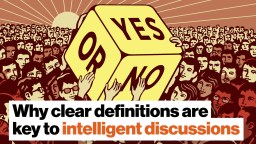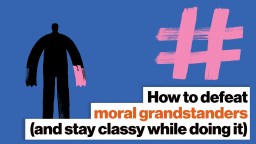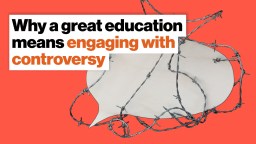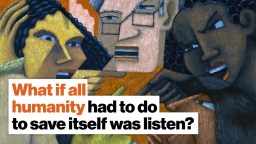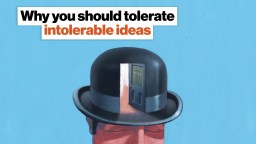debate
Why campuses are becoming polarized — and what we can do about it.
When it comes to scholarly engagement, what kinds of critique are considered appropriate and acceptable?
▸
2 min
—
with
Being precise about our ideas doesn’t just allow us to have better conversations, it’s also an incisive way to learn.
▸
6 min
—
with
How do you say “spiel”? Whether you say “shpeel” or “speel” may have to do with how you vote.
Sometimes, academic expression can make people uncomfortable. But this tension is a feature, not a bug.
▸
7 min
—
with
Logos, pathos, and ethos can help you bring people over to your side.
Political activism may get people invested in politics, and affect urgently needed change, but it comes at the expense of tolerance and healthy democratic norms.
The true course of progress is not only charted by great men and women, but also by ordinary people having conversations.
Outrage culture is causing provocative issues to be pushed out of public discourse and important artworks to be literally white-washed. Teaching civil discourse at universities is key to sustaining the American experiment.
Here are some practical ways to disagree and get along with someone at the same time.
▸
3 min
—
with
Want to be smarter than you were yesterday? Learn to have better conversations using these 3 design principles.
▸
5 min
—
with
These effective strategies can minimize harmful moral grandstanding – in yourself and in others.
▸
7 min
—
with
Changing people’s minds isn’t how we end polarization. Tolerance is the gateway to peaceful coexistence.
▸
3 min
—
with
Jonathan Zimmerman explains why teachers should invite, not censor, tough classroom debates.
▸
6 min
—
with
The Flynn effect shows people have gotten smarter, but some research claims those IQ gains are regressing. Can both be right?
Former president of the ACLU Nadine Strossen discusses whether our society should always defend free speech rights, even for groups who would oppose such rights.
▸
6 min
—
with
By working together, and learning from one another, we can build better systems.
▸
6 min
—
with
Eli Pariser explains why we can’t just think of civility as being polite to one another.
▸
3 min
—
with
If the only advice you’ve heard on public speaking is to imagine the audience in their underwear, this article’s for you.
When should you censor yourself, and when should you speak up? Emily Chamlee-Wright explains moral philosopher Adam Smith’s ‘impartial spectator’.
▸
7 min
—
with
Moral grandstanding is a vanity project that sabotages public discourse says moral philosopher Brandon Warmke.
▸
7 min
—
with
Step inside the unlikely friendship of a former ACLU president and an ultra-conservative Supreme Court Justice.
▸
5 min
—
with
What can and can’t you say? A brief glimpse of precedent-setting free speech cases in the United States.
▸
7 min
—
with
Keith Whittington, Professor of Politics at Princeton University, breaks down three key free speech arguments by John Stuart Mill.
▸
6 min
—
with
Should all speech be free? How much intolerance should society tolerate?
▸
6 min
—
with
Opinion is more compelling than fact. That’s tearing society apart.
▸
5 min
—
with
Ten of the most sandbagging, red-herring, and effective logical fallacies.
American society is in trouble if we let fundamental disagreements cancel entire relationships.
▸
3 min
—
with
Just because you disagree with something doesn’t mean that it isn’t true for someone else.
▸
3 min
—
with
A study out of Finland shows us that sex is sex and robots are robots, and the overlap is confusing.


